| :
The SVD – SSpS Mission in the English Department at Fu Jen Catholic University
聖言會與聖神會於輔仁大學外語學院英文系之共同使命
by Daniel J. Bauer鮑端磊
Content
Founding Years: 1963-1976
Years of Steady Growth: 1976-1990
Years of the New Taiwan: 1990-2003
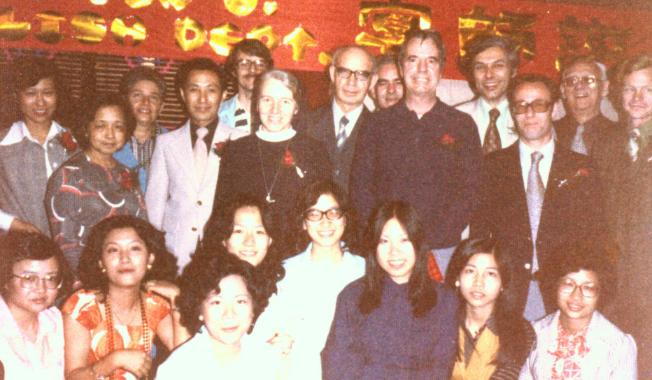
The second row from the 2nd on the left to right:
Ms. Banaag, Ms. Donna Schaeffer, Fr. Hsu, Mr. Richard Cameron, Sr. Helienna Krenn, Fr. Venne, Fr. Pierre Demers, Dr. Edward Vargo, Fr. Daniel Bauer and Fr. Stier.
Imagine you are standing before a large wall in a pleasantly decorated room. On that wall, you see photographs and drawings of people involved over a span of nearly forty years in a variety of activities in the English Department at Fu Jen Catholic University in Taipei, Taiwan.
Now imagine that each of these persons in the pictures is a Divine Word (SVD) Missionary Brother or priest or a Sister of the Sisters Servants of the Holy Spirit (SSpS), often called the Holy Spirit Sisters. Then what do you see?
You see men and women of several nationalities working as a team as they play exciting and important roles in the historic story of Fu Jen’s English Department. That story will be forty years old on October 21, 2003.
These pages look back on SVD and SSpS participation in the English Department at Fu Jen by dividing the years into three segments. The divisions are, of course, arbitrary, for they mark only the broad outlines of eras which could be divided in any number of ways. We will view these years of SVD – SSpS service according to Founding Years (1963-1976), Years of Steady Growth (1976-1990), and Years of the New Taiwan (1990-2003).
Founding Years: 1963 – 1976
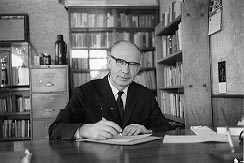 In the early 1960s, Father Richard Arens, the founding Dean of the College of Foreign Languages and Literature at Fu Jen, asked Father Peter Venne to lay the groundwork for the English Department and lead it as its first chairman. From the beginning, it was, to say the least, a daunting task. Father Venne had to recruit and organize a faculty ready to meet the needs of an incoming class of some 50 Chinese students in 1964, presumably few of whom could speak more than the most rudimentary English. Father Venne knew that after its first year, his faculty would have to quickly expand in order to teach the number of classes necessary for the department as it grew over the course of the next four years. After all, by 1968 the English Department would be home for some 200 students. In the early 1960s, Father Richard Arens, the founding Dean of the College of Foreign Languages and Literature at Fu Jen, asked Father Peter Venne to lay the groundwork for the English Department and lead it as its first chairman. From the beginning, it was, to say the least, a daunting task. Father Venne had to recruit and organize a faculty ready to meet the needs of an incoming class of some 50 Chinese students in 1964, presumably few of whom could speak more than the most rudimentary English. Father Venne knew that after its first year, his faculty would have to quickly expand in order to teach the number of classes necessary for the department as it grew over the course of the next four years. After all, by 1968 the English Department would be home for some 200 students.
Language with an appreciation for “political correctness” was still many years away. The day would come when his successors would call themselves a “chairperson” or simply “a chair.” Father Peter Venne, a German SVD priest with a doctorate in English Literature from the University of Zürich, was quite literally the chairman of Fu Jen’s English Department. In every sense of the word, he was also the department’s father.
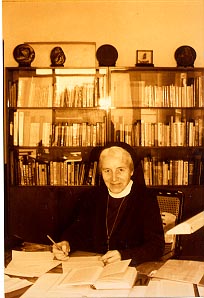 One wonders if the department’s first chair ever imagined an SSpS would one day take his place in the spacious office at the end of the 3rd floor corridor in the College of Foreign Languages and Literature. That Holy Spirit Sister, was, of course, Sister Heliena Krenn, an internationally known critic of the writer Joseph Conrad. Sister Heliena chaired the Department from 1983 – 1988 and also followed Father Venne as editor of Fu Jen Studies - - Language and Literature. Fu Jen Studies is an annual journal of scholarly studies also founded by Father Venne in the early years of Fu Jen Catholic University. After several years of administrative service in the College Library, in the late 1970s and till the end of the 90s, Sister Heliena taught English and American Literature, conversation and composition, guided readings, Bible as Literature, Greek and Roman mythology, and a variety of graduate seminars for master’s degree students. One wonders if the department’s first chair ever imagined an SSpS would one day take his place in the spacious office at the end of the 3rd floor corridor in the College of Foreign Languages and Literature. That Holy Spirit Sister, was, of course, Sister Heliena Krenn, an internationally known critic of the writer Joseph Conrad. Sister Heliena chaired the Department from 1983 – 1988 and also followed Father Venne as editor of Fu Jen Studies - - Language and Literature. Fu Jen Studies is an annual journal of scholarly studies also founded by Father Venne in the early years of Fu Jen Catholic University. After several years of administrative service in the College Library, in the late 1970s and till the end of the 90s, Sister Heliena taught English and American Literature, conversation and composition, guided readings, Bible as Literature, Greek and Roman mythology, and a variety of graduate seminars for master’s degree students.
When he began to turn the wheels that ran the English Department in 1964, surely Father Venne had no way to visualize the exciting story ahead. Could he have imagined the department would eventually include an undergraduate Bachelor of Arts program for approximately 320 students a year, with a faculty of some 25 instructors, not to mention a graduate institute offering Master of Arts degrees? (The master’s program was begun by department chair Father Pierre Demers, S.J.) Also, Father Venne would have needed a crystal ball to look into the future and see that his successors would include the Jesuit Father Demers and a line of gifted lay scholars, one of whom was once an English Department student herself, Joyce Chi-hui Liu.
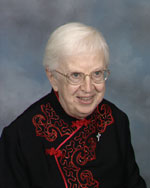 Department history shows that from the very beginning, SVD and SSpS missionaries worked in close daily contact with their colleagues of many nations and backgrounds. Some of the colleagues were members of other religious orders, such as Father Sheridan and Sister Rose Boudreau SP, and Father Demers and Father Sorrel, both Jesuits. Several colleagues were Benedictines, such as Brother Nicholas Koss, who went on to become a full professor and Dean of the College of Foreign Languages and Literature, and Fathers Robert Roche and Paul Maher. Most of the colleagues for the Holy Spirit Sisters and SVDs were lay people. Some were Catholic or Protestant in spiritual beliefs, but most were not. The missionaries of the founding years saw themselves as members of a team of educators, working in collaboration with other professionals who were devoted to the needs of their students and the larger university community at Fu Jen. For forty years, service and collaboration have been ideals and goals for which to strive for SVD and SSpS missionaries in Fu Jen’s English Department. Department history shows that from the very beginning, SVD and SSpS missionaries worked in close daily contact with their colleagues of many nations and backgrounds. Some of the colleagues were members of other religious orders, such as Father Sheridan and Sister Rose Boudreau SP, and Father Demers and Father Sorrel, both Jesuits. Several colleagues were Benedictines, such as Brother Nicholas Koss, who went on to become a full professor and Dean of the College of Foreign Languages and Literature, and Fathers Robert Roche and Paul Maher. Most of the colleagues for the Holy Spirit Sisters and SVDs were lay people. Some were Catholic or Protestant in spiritual beliefs, but most were not. The missionaries of the founding years saw themselves as members of a team of educators, working in collaboration with other professionals who were devoted to the needs of their students and the larger university community at Fu Jen. For forty years, service and collaboration have been ideals and goals for which to strive for SVD and SSpS missionaries in Fu Jen’s English Department.
The years of a rapidly developing Taiwan were still some distance in the future when Father Venne drew up his first class schedules and faculty lists in the mid-1960s. Thus, for faculty members he was especially indebted to the contributions of foreign missionaries who served basic student needs with skill and enthusiasm, even if their grasp of Mandarin Chinese left something to be desired. What did that matter? From 1964 till the present, Fu Jen’s English Department has been known all over Taiwan for insisting on English as the language of instruction. Even today, top scholars at respected public universities express public recognition for the quality of Fu Jen’s education in English language.
The Holy Spirit Sisters played an extremely important role in the founding years of the English Department. Sister Agatha Bramkamp from Germany, who at that time was called Sister Gertrude, was among the first and most active of the Sisters on the faculty. Sister Gertrude taught courses in phonetics, linguistics, English conversation, and English composition. With other Holy Spirit Sisters, she also offered a course called “Womanhood,” which helped co-eds to develop self-confidence and self-understanding as educated young women who might well take on future careers in education, business or industry while still devoting themselves to family life. Sister Gertrude worked closely with SVD Father Arnold Sprenger in the late 1960s in offering government sponsored “How to Teach English” seminars for high school teachers throughout the island. During that time, she was reputedly the first non-Chinese woman to enter aboriginal villages in the mountain heights of Tefuyeh and Dapang, where she made tape recordings and gathered research for the study of linguistics and phonetics in the language of the Chou tribe.
Sister Gertrude left Fu Jen to study German Literature at Johns Hopkins University from 1974-75, and continued at Cornell University till 1984, where she finished her doctoral dissertation on the turn of the century writer Ebner Eschenbach. She returned to Fu Jen in 1985 and continues to teach and do research in the German Department. She still offers occasional courses in the master’s program for the English Department.
Another key player in the early story of the English Department was Holy Spirit Sister Cora Colett from the Philippines. Sister Cora was popularly known as Sister Laetifera, meaning “One Who Bears Joy.”
Sister Laetifera’s unique gift of joy centered on her life long passion for drama and the performing arts. After service at Fu Jen from 1965 till 1974, she studied theater at Cornell University in the United States, writing her dissertation on Heinrich Ibsen. University theater productions in English are fairly common in today’s Taiwan, but that wasn’t the case in the late 1960s and 1970s. During her teaching days at Fu Jen from 1965 – 1973, Sister Laetifera’s lively and well crafted productions contributed much to winning a national reputation for the English Department as a place where foreigners and Chinese worked together to offer students an opportunity to perform world famous dramatic scripts in English.
This contribution to the teaching and sharing of the performing arts in the department was historic and immensely important. Drama has continued to be a mainstay in student activities not only in the English Department, but throughout the entire College of Foreign Language and Literature at Fu Jen, which in 2003 comprises six departments. Interest in dramatic performances was an important impetus in the construction of the beautiful theater and conference center in the new Divine Word Building (Sheng Yen Lou) in the late 1990s. (The theater and conference center is named for Father Arens SVD.) Locally acclaimed director and professor of drama Stan Lai was one of Sister Laetifera’s early students in the English Department. Noted Taipei critic and playwright Casey Chi and the painter-poet-professor Lo Ching are also former English Department students and faculty members who she influenced.
Student drama productions flourished in the English Department in the 1970s and throughout the 80s under the enthusiastic guidance of faculty members Donna Schaefer, Richard Cameron, and Father Edward Vargo SVD. During the 1990s, the department welcomed the services of Dr. Lyn Scott as College theater manager, English Department drama director, and instructor of performing arts. Doris Li-wen Chang, Margarette O’Connor, and Cecelia Hsueh-chen Liu have also made important recent contributions in theater direction for the department. The early vision and energetic spirit of Sister Laetifera, nurtured by collaboration between SVD and SSpS missionaries with their colleagues, continues in the department till today.
When Father Venne developed his first curricula in the English Department in the mid-1960s, he needed to design course offerings that would meet an unusually wide spectrum of needs. In the opening years of the 21st century, the people of Taiwan consider English language to be an important and even vital language. Young people regularly flock to “cram schools” of various quality, which are called “puhsipans,” to sharpen their English ability. For better or worse, cable television and Hollywood movies have made English popular or, as our young friends say, “hot.”
Back in 1964 and extending into the late 70s however, English in Taiwan was a very different story. For many in Taiwan at that time, mastery of English seemed an all but impossible dream. American military personnel dotted the residential and business neighborhoods of Taipei, and English language was associated in the public mind with a culture far distant from the shores of Taiwan. Two small daily English newspapers struggled to survive as they served the needs of the expatriate English speaking community, and when the American military left in the late 70s, media and government leaders speculated openly that Taiwan might lose its one and only native English speaking radio station. In time, after the departure of the American military in 1979, station ICRT (International Community Radio in Taiwan) came into being. In 2003, Taiwan enjoys the benefits of healthy competition between three daily English newspapers, each with reported readerships of approximately 100,000.
In the opening years of the English Department, no need was more urgent for Father Venne than that of teachers of basic courses in English language and introductions to various segments of English and American literature. Father Venne saw any courses that kept students looking at English words and using them as useful. Early offerings in English pronunciation, travel English, business English, speech and debate, and introduction to English linguistics were common. Of course, offerings in English conversation and composition and English and American literature were plentiful.
For these basic courses, SSpS Sister Anna Marie and Sister Ellen offered valuable service. Their cheerful personalities and American accents seemed like gifts from heaven for department students especially thirsty for so called American accented pronunciation. Sister Ellen taught at Fu Jen for ten years. Father Arnold Sprenger SVD, chair of the German Department, also worked double time as a part time professor in the English Department. His interest and research work in linguistics and the teaching of foreign languages were valued areas of expertise.
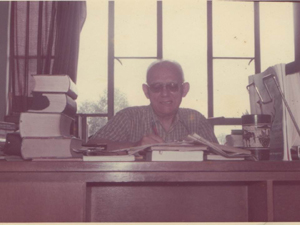 In the founding years of the department, Father Joseph Stier SVD joined these Sisters on the faculty. As a young priest, Father Stier had served in mainland China and had spent time in a labor camp under the control of Japanese soldiers. In the mid-1970s, his northern Kentucky drawl both fascinated and confused students in an array of conversation and composition courses. Several of his students living in Taipei still treasure recollections of his enthusiastic rehearsals for the popular play, You Can’t Take It With You, which the English Department staged in 1978. Father Stier passed away of heart disease one year later. In the founding years of the department, Father Joseph Stier SVD joined these Sisters on the faculty. As a young priest, Father Stier had served in mainland China and had spent time in a labor camp under the control of Japanese soldiers. In the mid-1970s, his northern Kentucky drawl both fascinated and confused students in an array of conversation and composition courses. Several of his students living in Taipei still treasure recollections of his enthusiastic rehearsals for the popular play, You Can’t Take It With You, which the English Department staged in 1978. Father Stier passed away of heart disease one year later.
Another key player in the early years of the English department was a dedicated and colorful young SVD Brother from Philadelphia named Brother Norbert Hogan. Brother Norbert later took on his birth name and became known to thousands of Fu Jen students as “Brother Pat.”
Brother Pat Hogan served at Fu Jen for more years than any American SVD, Brother or priest. He began in the mid-1960s as an assistant and then administrator of the Finance Office, and went on to teach language courses in the department before returning to the United States for M.A. work in linguistics at Georgetown University in the early 1970s. He returned to Taiwan ten years later and taught for another sixteen years in the Linguistics M.A. and General English programs, while at the same time guiding the Language Center as its Director. (The Language Center offers courses in Mandarin Chinese and Taiwanese languages to foreigners from all over the world.) Brother Pat was widely known for founding the Ecology Club (a first on Taiwan’s university campuses), in which several English department students were active. He also sponsored study trips abroad for Fu Jen students. Though no longer a member of the department faculty in the 1980s, Brother Pat was still respected for the publication of a set of English language tape recordings, which matched a textbook he had earlier written on English used in police and legal work.
Father Ray Lennon of the United States was another SVD who taught in the department in the late 60s. He served as well as a golden-voiced recorder in the College language laboratory.
As he sketched course plans and recruited faculty in the founding years of the English Department, Father Venne had to meet basic interests among his students for fundamental conversation and writing classes. After the opening years rolled by, however, he became increasingly concerned about students with obvious intellectual promise who hoped to go on for doctoral work abroad and return to teach in the Taiwan educational system. These were students keenly interested in English, American, and various areas of comparative literature. Some of these department students hoped to enter other disciplines related to the study of literature, such as art, cultural history, and mass communications. The founding father of the English Department wanted to prepare these young people for careers that demanded a wide background of intellectual understanding.
In the early 1970s, to meet the demand for courses in the history of art, mythology, the Bible as Literature, as well as more comprehensive surveys in masterpieces of English and American literature, Father Venne increased the number of courses in the department that dealt with the humanities. Sister Heliena Krenn SSpS and Father Edward Vargo SVD were among the professors who made this development possible. A number of foreign faculty were also valuable contributors to these efforts, including Donna Schaefer, Father Sheridan and Father Pierre Demers, S.J. Father Demers went on to serve as department chair and founder of the master’s program in the late 1970s and early 80s.
Years of Steady Growth: 1976 – 1990
Father Edward P. Vargo SVD came to Fu Jen University in 1974 with a strong background in American and English literature and an impressive list of dramatic and multimedia productions from his earlier work in the United States. His years in the 1960s and early 70s at Divine Word Seminary in Techny, Illinois and Divine Word College, Epworth, Iowa, seemed perfect preparation for a long and rich career in the English Department at Fu Jen. When he moved to Assumption University in Bangkok, Thailand twenty years later, Father Vargo left behind him a legacy of which he and the Divine Word Missionaries could be justly proud.
With a Ph.D. in English Literature from the University of Chicago, Father Vargo slipped quickly into the undergraduate curriculum as an associate professor of Greek and Roman Literature, Film Arts, Performing Arts, and a variety of courses in English and American Literature. In his later years he also taught Science Fiction and Film. His graduate institute courses in the department included seminars on John Updike, the subject of his Ph.D. dissertation, and William Faulkner and other major writers.
Father Vargo’s experience and interest in theater were deep. At Divine Word Seminary in Techny, Illinois and later at Divine Word College, Epworth, Iowa, in addition to musical – media productions, he had directed six dramatic performances, including T. S. Eliot’s Murder in the Cathedral, Paddy Chayefsky’s Gideon, and Shakespeare’s Coriolanus. Sister Laetifera’s earlier groundwork in English Department drama had sown seeds that Father Vargo would later bring to fruition in student dramas such as Moliere’s The Would-Be Gentleman and Euripides’s The Trojan Women.
Many at Fu Jen still remember Father Vargo’s contributions not only to the English Department, but in the College of Foreign Languages and Literature at large, where he served as dean from 1984-1990. He was instrumental in beginning a series of College conferences on Religion and Literature, and in founding the Graduate Institute of Translation and Interpretation.
Years of the New Taiwan: 1990 – 2003
Father Vargo was an important mentor for a young SVD priest who first joined Fu Jen’s English Department as an instructor in the late 1970s. Father Daniel J. Bauer had met him while a student in the Philosophy Department at Divine Word College in Epworth, Iowa. The then-seminarian even appeared in a minor role in the earlier mentioned drama, Gideon. Father Bauer was a department colleague of both Father Vargo and Father Stier from 1977 to 1980.
Father Bauer returned to the United States in 1980 for doctoral studies in comparative literature at the University of Wisconsin in Madison, and re-joined the department faculty in the fall of 1988. His Ph.D. dissertation was a comparative study of satirical portraiture in Wu Ching Tze’s famous Chinese classic, Ju-lin Wai-shih and Henry Fielding’s Tom Jones. He continues to teach a variety of courses useful for students in the undergraduate and master’s program in the department. In recent years Father Bauer has been active in local Chinese-English and journalistic circles. His weekly Sunday column in the English newspaper the China Post views a issues related to society, politics, culture and education.
Father James Liebner SVD was an active and popular department colleague in the late 1990s. He served at Fu Jen for four years as instructor of American literature and English conversation and composition, and was noted for his skills as a professional photographer. Department students with a love for costumes and a festive American style Halloween party have this missionary to thank for the annual Students Association Halloween party, which Liebner helped to institute as an off shoot of his American literature course. (In the inaugural Halloween party, Father Liebner dressed up as Huck Finn from the classic novel by Mark Twain.) He continues to teach today in his SVD ministry in mainland China.
Both the society and educational system that SVD and SSpS missionaries knew in the founding years of the English Department changed radically by the time the late 1980s arrived. Martial law was lifted in 1987, freedom of the press gave birth to a veritable cultural explosion, and democracy arrived with at times tumultuous results for the island. Taiwan’s economy also saw rapid development in the 1980s, even as its society struggled to preserve traditional values of respect for elders, devotion to family and children, and excellence in educational standards.
Life in the English Department changed with the times from the late 80s throughout the whole of the 1990s. Religious missionaries who had been valued partners with the SVDs and SSpS in the department became fewer in number, and gifted lay colleagues moved into positions of leadership and administration both on the Fu Jen campus and in other local universities. Several lay missionaries and members of secular religious institutes, as for example Belen Sy, became beloved faculty members. Former students of Sister Heliena, Brother Pat, and Fathers Venne, Stier, Vargo and Bauer returned to Taiwan with doctorates or master’s degrees in literature or linguistics, and joined the English Department as bright young professors.
The mid-1990s saw the entire College of Foreign Languages and Literature hurrying to adapt to a spate of experiments and revolutionary new policies announced by the Ministry of Education. Administration procedures became more complex as decentralization occurred, and more power was given to individual faculty members in hiring and course planning decisions. Suddenly high school seniors all over Taiwan found it possible to enter universities not only by means of the traditional two day written examination, but by an exciting array of channels called by attractive names such as “Recommended Student,” and “Direct Entry.” Among the SSpS and SVDs, these developments affected Sister Heliena and Father Bauer, the most. Both were called upon to work more closely than ever with colleagues on faculty committees for these new admission procedures.
In the year 2003 only one SSpS and one SVD, Sister Agatha and Father Bauer, taught in the English Department at Fu Jen. They continued to serve with pride and enthusiasm, however, grateful for their many brothers and sisters who came before them, or who served beside them as colleagues in recent years. Although Taiwan has seen incredible changes in its society and political structure since the SVD – SSpS story began in the English Department at Fu Jen thirty-nine years ago, the day to day duties, except for high profile administrative posts, have not changed so very much. We continue to prepare our classes, to teach, to do translation, writing, and research, to participate on various committees, and to counsel.
Our SVD – SSpS mission at Fu Jen Catholic University in Taipei, Taiwan has always been a call to service and collaboration. We continue to do all we can to lend a helping hand for our students and colleagues in these, the early days of the 21st century. It is our privilege to accompany our friends who share our love for young people, learning, and education on the campus of Fu Jen.
|